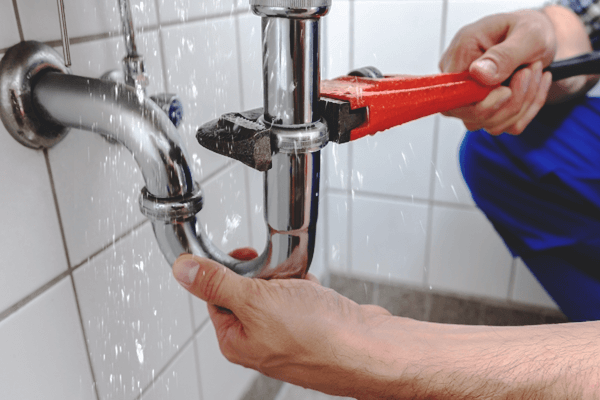Discovering a home plumbing issue is a stressful event. Plumbing repairs tend to be costly and cause extensive damage if left unaddressed. However, failing to detect plumbing issues is even worse.
While some plumbing problems are obvious and easy to detect, there are plenty of subtle signs of a deeper issue that get overlooked.
Here are some common home plumbing issues and signs that something is wrong.

Contents
Signs of Mold and Mildew
Mold and mildew aren’t always a plumbing issue. According to the experts at I Need The Plumber & Air Conditioning, the development of mold could be related to plumbing, ventilation, or roofing. The problem is that many homeowners automatically think mold and mildew growth is an HVAC issue rather than considering plumbing as a culprit.
If your pipes are leaking in the walls, the extra moisture could lead to mold. Other signs of a leak include peeling wallpaper or paint in certain areas or water spots on the ceiling. Consider reaching out to a plumber to eliminate a potential leak before investigating other causes.
Changes in Water Pressure
It’s normal to experience fluctuations in water pressure, especially in older homes. You might notice a change in water pressure if someone turns on the washing machine while in the shower or flushes a toilet. Similarly, changing faucets often results in a change in pressure, especially when adding an aerator.
However, these disturbances have clear causes. If your water pressure suddenly changes with no explanation, you could have a leak or a clog. If you notice a sudden change in pressure that doesn’t automatically correct itself when the other taps and appliances are turned off, call a plumber ASAP.
Weeping Water Tank
It’s normal to experience some condensation on your water heater. This scientific phenomenon occurs when cold air and hot water come in contact with one another and vice versa. However, excessive condensation or weeping can be indicative of a deeper issue.
If your water tank continuously weeps, it could be a sign that your tank isn’t big enough for the household demand. Conversely, it could be a sign of a leak.
If you’re concerned about a leak, turn off the water and check the fittings. If there are no loose fittings and connectors, call a plumber ASAP. If your water tank is due for an upgrade, it’s also wise to consider switching to a tankless (on-demand) water heater to prevent further issues.
Slow Drains
Slow drains are another issue that could be something minor or something serious. An isolated slow drain often indicates a clog within the pipe. However, that clog could be something serious that needs to be removed before it causes damage.
Plumbing experts advise against using chemical drain cleaners, as it causes damage to the environment and the pipes over time. Instead, try a natural solution of baking soda, vinegar, and hot water to see if you can dislodge whatever is in place.
If the natural solution doesn’t work, call a plumber to come snake the drain and evaluate the situation. Hopefully, it’s a quick fix rather than a sign that your sewer is backing up.
Water Stops Running
If the water stops running entirely, it’s an obvious sign that something is wrong. If you’re on a well, the first step is to check and see if you’re out of water. If you’re on municipal water, check in with your neighbors or social media pages to see if you’re the only one affected.
If you seem to be the only person affected and there’s no obvious cause, call a plumber to take a look.
Water Continuously Runs
On the other side of the coin, it’s also integral to call a plumber if your water runs non-stop. Sometimes you won’t notice the water itself, but the sound of your pump and pipes running in the background.
If you notice your toilet continuously running, first check to see if the valves in the tank need to be replaced. The mechanics of a toilet are pretty simple. The tank empties to flush, then refills until the water reaches the ideal level and forces the flapper shut. If a chain breaks or valve needs to be replaced, it will keep running. Fortunately, replacement parts are cheap and easy to install without a plumber.
A gurgling toilet indicates that there’s a block somewhere deeper down the line, similar to a slow sink. Call a plumber if you’ve addressed what’s happening in the toilet tank and are still experiencing issues.
Dramatic Bill Changes
Utility bills have skyrocketed as an unfortunate side effect of the global pandemic. However, it’s easy to detect whether your bill has increased due to inflation or a hidden leak.
If you notice a dramatic bill increase, compare your latest bill to the previous ones. Take a look at the costs associated and compare your consumption rate. If your consumption appears to be significantly higher, there’s likely a leak. Call your water company to report the issue and call a plumber as soon as possible.
Bad Smells
Ideally, your sinks should never emit an odor. If you notice a bad smell coming from the sink, try the natural drain cleaning method listed above to remove food residue. If you still notice an odor, there could be something direr causing a partial block or back up further down the line.
Landscaping Issues
One of the lesser-known signs of plumbing issues is changes in your lawn and landscaping. If you notice a patch of grass that’s newly green and lush, it’s not a sign of your advanced gardening skills; it’s a sign that there’s a septic leak. This issue is typically caused by a tree root cutting through the sewer line and should be addressed immediately.
You may also notice cracking or sinking in your walkway or more moisture pooling in your yard.
New Rodent Issues
Finally, if you suddenly experience an issue with rodents in your home or yard, it could indicate an infiltrated sewer line. Hire a plumber or pest expert to come run a camera down the line and determine where the issue is.
When it comes to plumbing issues, it’s best to fix them sooner rather than later. The expense associated with plumbing repairs is far less than the cost of leaving them unattended. Be mindful of these common signs of plumbing issues so you can act quickly.
